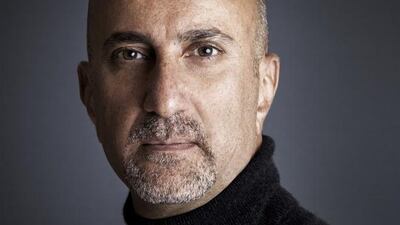There will be no shortage of conspiracy theories at the Sharjah International Book Fair on Wednesday. Because that's when the Lebanese-American author and screenwriter Raymond Khoury, author of The Last Templar, will take the stage during a session titled Literature and Creative Enjoyment.
His career as a best-selling thriller author began in 2005 with the publication of The Last Templar. It was a book, he admits, that caused him a fair amount of disappointment and heartache before kick-starting a popular adventure series.
With the third instalment, Rasputin's Shadow, released last year, he can look back at a creative journey that was filled with as much enjoyment as risks.
So you initially wanted to be an architect?
I studied architecture in Beirut and when I graduated, the war was going on there, so I hovered between Paris and London looking for work. It was a tough time as architecture schools were closing down and there were no jobs anywhere. I realised I was either going to starve or I had to reinvent myself.
That’s when you chose to be a writer?
Actually no. I wanted to do something that perhaps I may not like but that pays well. So I entered investment banking and thought I would wait until the situation in Lebanon gets better, so I can go back as an architect and rebuild my country. I left banking after three years. I hated it and Beirut was still a mess. Then I realised, I am living in London, a place where you can earn a salary doing creative things. I always loved writing so I began focusing on that.
You began working on screenplays and eventually joined the writing team on the hit BBC spy drama Spooks. Did your experience growing up in war-torn Beirut help with that?
It was Beirut in general. Growing up there was really great because you get exposed to so many things on television from American and British to French material. The same channel would have Hawaii Five-0, Mission Impossible and Fawlty Towers. There is so much creativity in Beirut and it was really important in influencing me.
What led you to make the move from the steady salary of television writing to the riskier world of novels?
My first novel, The Last Templar, was actually my third screenplay and that was written before I was in the business. That screenplay found its way into the hands of very powerful people back in 1996. The interesting thing was an agent called me to say that this should be a novel before it becomes a movie. I told them that I wasn't a novelist and they said they would give me a ghostwriter. So I flew to New York to sign this mega publishing deal and I find out the ghostwriter wanted to radically change the book in a way that I wouldn't accept.
You said no to a big deal? They must have thought you were crazy.
Everyone did. I would have earned a million dollars and I had no real money – and my wife was pregnant. The thing with the change was that The Last Templar has a big debate about the Bible and that was the heart of the book. But the publishers wanted it to change to something about gold or diamonds. This was because back in 1996, books about religion were not big and they thought the public wouldn't be interested in it. Years later, I got another agent and she convinced me to go back to the novel and this time I should write it myself. I began to do it on the side while I wrote for Spooks. Then halfway during writing the novel, The Da Vinci Code was released.
Did you feel like you had missed the boat, with The Da Vinci Code’s huge success?
I was absolutely depressed. I called my agent and told her I was done with my book. For years the story caused me heartache and it was the bane of my existence and I would quit and focus on screenplays. She said: please continue, as the book was fantastic.
Do you feel The Last Templar ultimately cashed in on the success of The Da Vinci Code?
I did. I benefited from the huge wave of success of The Da Vinci Code and there were a lot of publishers looking for writers to publish clones to fill that hunger. I think The Last Templar was successful because it was written six years before The Da Vinci Code, so it was more organic and written with the right intentions. I have continued writing novels ever since.
Raymond Khoury will appear at Sharjah International Book Fair on Wednesday at 7.30pm. His panel – Literature and Creative Enjoyment – is at The Book Forum, The Expo Center. For more information, visit www.sharjahbookfair.com


